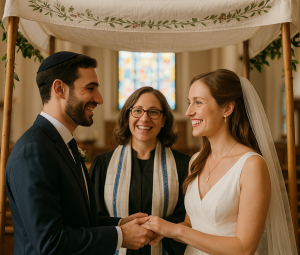 Karin Albou’s The Wedding Song, which was presented by the Toronto Jewish Film Festival on Oct. 25 as part of its “Chai Tea & A Movie” series, is set in Tunis during World War II, when the German army briefly occupied Tunisia and persecuted its Jewish citizens. (with video)
Karin Albou’s The Wedding Song, which was presented by the Toronto Jewish Film Festival on Oct. 25 as part of its “Chai Tea & A Movie” series, is set in Tunis during World War II, when the German army briefly occupied Tunisia and persecuted its Jewish citizens. (with video)
Director Karin Albou and lead actor Olympe Borval
 Karin
Karin
Albou’s The Wedding Song, which was presented by the Toronto Jewish
Film Festival on Oct. 25 as part of its “Chai Tea & A Movie”
series, is set in Tunis during World War II, when the German army
briefly occupied Tunisia and persecuted its Jewish citizens.
Director Karin Albou and lead actor Olympe Borval
Albou focuses on the friendship between two young women, an Arab and a Jew. Myriam (Lizzie Brochere), the Jew, yearns for a suitable boyfriend, while Nour (Olympe Borval), the Arab, longs to marry her fiancé and educate herself.
File footage of the pro-Nazi Mufti of Jerusalem blasting Jews and Adolf Hitler delivering yet another fiery speech precede the spectacle of German troops marching into Tunis. Their arrival portends bad times for the Jewish inhabitants of Tunisia, a French colony until now .
The mounting anti-Jewish atmosphere is conjured up skilfully by Albou. In a sauna, a Muslim woman complains that Jews are worse than the French. On state radio, an announcer denounces Jews and blames them for the incessant Allied bombing raids on Tunis.
With the mood of the film darkening, Albou switches seamlessly between the central characters, Myriam and Nour, who comfort each other as ageless social pressures are brought to bear on them.
Tita, Myriam’s widowed mother, wants her to marry Raoul (Simon Abkarian), a kind medical doctor who’s considerably older. “This man was sent by God,” says Tita, a poor seamstress portrayed by Albou herself. In an attempt to break Myriam’s resistance, Tita says that she learned to love her late husband.
Nour, meanwhile, struggles to come to terms with her father’s edict that she cannot marry her fiancé and cousin, Khaled (Najib Oudghiri), unless he finds gainful employment.
As these dramas unfold, Albou focuses on the punitive measures the Germans take to isolate the Jewish community.
A hefty fine is imposed on Jews.
A German airplane drops leaflets claiming that Germany is a friend of the Muslims and that Allied aircraft are bombing Tunis on behalf of Jews.
German troops burst into Myriam’s home, making off with household possessions, including Tita’s sewing machine.
Two thousand Jewish men are ordered to report for forced labour battalions to dig ditches and trenches.
Eventually, the malevolent German presence drives Myriam and Nour apart. Khaled, having taken a job with the German administration, instructs Nour to sever ties with Myriam. Nour complies with his demand, but she is basically ambivalent.
On the one hand, she saves Myriam during a German raid and tells Khaled that she still considers Myriam her best friend. On the other hand, having apparently been brainwashed by Khaled, she claims that Jews exploit Muslims and are “different.”
These emotional crosscurrents form the beating heart of The Wedding Song, one of the few films that have dealt with the Nazi interregnum in North Africa.
Surprisingly enough, given the conservative nature of Tunisian society, this French-language film with English subtitles contains nudity and sexually explicit scenes. In one unusual scene, for example, a woman on the eve of her wedding is stripped of her pubic hair in a traditional North African ceremony.
Aside from its compelling narrative and exotic locale, The Wedding Song is distinguished by a fine cast whose actors infuse the script with spirit and a sense of urgency.






